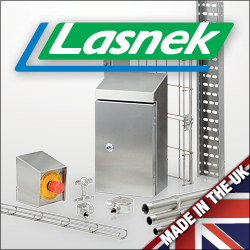
Posted to News on 19th May 2010, 14:35
SKF bearings suit demanding conditions for church bells
Church bells spend long periods inactive, then exert variable oscillating loads on the bearings, which must sometimes also accommodate misalignment; SKF describes how its bearings have proved to be capable of handling this complex application.
Whites of Appleton manufactures, supplies and installs virtually everything to do with bells, apart from the bell casting and tuning. It works all over the UK and has a number of high-profile installations on its books, including St Paul's Cathedral, Windsor Castle and Canterbury Cathedral. According to Brian White, nephew of the founder's great-grandson: "The headstock design has changed significantly over the last century, with timber headstocks being replaced by those made from steel and cast iron, but the one thing that has not changed since the 1920s, from our perspective at least, is the use of SKF bearings.
"My grandfather started using ball bearings back in the 1920s to replace half-cup gunmetal bearings, which needed regular oiling. Our original supplier was Ransome, Hoffman and Pollard, but one of our competitors at the time, the Whitechapel Bell Foundry, was using Ransome and Marle bearings and struck a deal that prevented them from supplying any competitive companies. We had to find another supplier, leading to us approaching SKEFKO and, in its most modern guise, SKF. It is fair to say that we have never regretted this decision. Indeed, I make a point to all of our suppliers that if any of the bearing components are not SKF, they get sent right back."
When Whites mounts bells, it knows exactly what bearing to specify. White explains: "At the horizontal position of the swing, the bearings will experience a force equivalent to 2.5 times the static weight of the bell. At bottom dead centre this rises to four times the static weight, so once we know the weight of the bell, we know which bearing to go for."
Self-aligning ball bearings
Typically, depending on the application requirements, Whites opts for one of seven different variants in SKF's self-aligning ball bearing range, sourced through the Oxford Service Centre of SKF's authorised distributor Eriks. Branch Manager, Christian O'Connor, says: "Whites uses the name of the church for its order numbers, so our order book read like a 'Who's Who' of UK churches... from Abingdon to Winchester. It always makes me smile, as it makes a change from the normally anonymous order numbers. Indeed, on my travels, I often wonder if the churches I drive past contain SKF bearings that we have supplied."
The self-aligning ball bearings - supplied with tapered bores and adapter sleeves for easy mounting and dismounting - are particularly suited to applications that exhibit misalignment either in the shaft housing or bearing seat. They offer extremely low friction, low operating temperatures, reduced vibration levels, lower noise levels and, particularly advantageous for this type of application, low lubrication requirements. Occasionally an installation may call for SKF Explorer spherical roller bearings made of patented SKF Xbite steel, which has a longer life due to its greater hardness.
Thanks to their ability to accommodate very heavy radial and axial loads in applications prone to misalignment, SKF says its Explorer spherical roller bearings can last several times longer than their rivals under typical heavy-duty conditions. The bearings are housed in SKF's standard SNL plummer block housings, which are available in a wide variety of sizes to match the bearing specified. As well as offering a reinforced base, a variety of mounting options, good thermal performance and easy re-lubrication, their versatility means that it is seldom necessary to resort to tailored housings for specific applications. The bearing assembly is completed with Type C felt seals, which suit the semi-external environment and the shaft deflection as well as, according to Whites, being particularly good at keeping out pigeon droppings - although this is unlikely ever to be an official specification.
Lubrication
Finally, the whole assembly is lubricated using a general-purpose industrial bearing grease. Whites uses the bearings and housings to support the bell via two gudgeon pins that extend from either end of the headstock; according to Brian White: "To my knowledge we have not had one single bearing failure, which is even more impressive when you consider the wide variety of forces the bearings must see, both at rest and in motion."
Even though it is a very old company, Whites has some very contemporary quality control guidelines. gudgeon pins that extend from either end of the headstock; according to Brian White states: "We have to make sure that the products and services we supply are suitable for the particular application. It is a false economy to go for cheaper, inferior products if they are just going to fail; meaning an extremely long road trip for us, and in many cases the burden of all the maintenance costs. We fit SKF because we know the bearings do exactly what we want them to do and the fact that we have had no failures is a good enough reason for me."



















